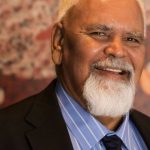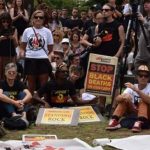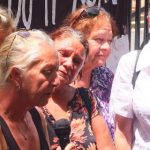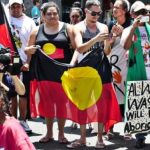Indigenous Treaty Now, Not Just Constitutional Recognition
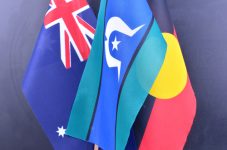
The Referendum Council is currently travelling around Australia carrying out the Dialogues: a series of meetings with First Nations peoples to discuss the issue of recognising the nation’s Indigenous people within the Australian constitution.
The meetings seek to establish an agreement on whether, and if so, how Aboriginal and Torres Strait Islander people would be recognised within the nation’s founding document.
The Adelaide meeting is taking place this weekend. And the findings from each of the meetings will be reported at the First Nations Convention at Uluru in late May.
Constitutional recognition
The constitution made no mention of the nation’s First Peoples when it came into effect on January 1 1901. Since the beginning of this decade, it’s become a priority of the federal government to rectify this exclusion.
Established in December 2010, the Expert Panel was tasked with providing recommendations on how constitutional recognition should be actualised. Their report was tabled in January 2012.
The following year, the Aboriginal and Torres Strait Islander Peoples Recognition Act was passed, enabling a referendum to be held on the issue. Former prime minister Tony Abbott was a strong advocate of the proposal and was pushing for the national vote to happen this year.
The group ‘Recognise’ was launched in 2013 to promote the constitutional amendments. This high-profile campaign is backed by many of the country’s football teams, banks and mining companies. Last year, they were sending delegates out to spruik recognition in regional areas.
A token gesture
The inclusion of Aboriginal and Torres Strait Islander people in the constitution has been presented to the nation, not only as a way to amend this omission, but also as a road to reconciling, to a degree, some of the huge injustices perpetrated upon Indigenous people since the time of European occupation.
However, many First Nations peoples see the campaign for constitutional recognition as a mere token gesture. They believe it’s causing division amongst Indigenous Australians, and will bring no real improvements to their communities.
And they state that the focus on recognition is overshadowing more significant avenues that could be taken to establish some form of reconciliation.
Sovereign nations
Terry Mason views the proposal for constitutional recognition with suspicion. He’s the curriculum developer and lecturer at the Institute of Koorie Education at Deakin University. And for him, the proposition “is poorly defined and defended.”
According to Mason, the reason many Indigenous people view the recognition proposal with suspicion is that it’s been initiated by a government “that sent the troops into Aboriginal communities under the NT Intervention based on proven false reports.”
Indeed, in the various states where Indigenous recognition has been added to the constitution over recent years – Victoria being the first in 2004, along with NSW, South Australia and Queensland – they “have proceeded to pass legislation to the detriment of Aboriginal peoples,” Mason said.
So why would this be any different at the federal level?
The flaw in the constitutional recognition dialogue, Mason points out, is that it ignores the matter of sovereignty. The British occupation of Australia was based on the legal fiction of Terra Nullius: the concept that the land had no owners.
“Sovereignty has not been ceded, nor extinguished,” the Awabakal elder declared, adding that any form of recognition should take place via a framework of treaties. “Australia is wedded to differential treatment and recognition in the constitution, without treaty frameworks first, reinforces this abuse.”
Treaty now
A treaty is a formal settlement or agreement made between independent states. Treaties establish binding obligations and formal relations between two parties.
Mr Mason explained that treaties between the government and each of the land’s Indigenous nations would deal with matters of self-determination, land rights and custodianship. And he believes they would guard against “discriminating legislation,” such as the Turnbull government’s recent attempts to amend native title laws.
“Aboriginal peoples must be able to take control of their own lives and resources in a progressive manner at both political and economic levels,” Mason added.
Past discussions
Australia is the only Commonwealth country that has not established a treaty with its First Peoples. New Zealand and Canada have treaties in place that incorporate compensation, as well as land and fishing rights.
But the concept is nothing new in Australia. When the colony of Melbourne was being set up, one of the founders John Batman established a form of a treaty with the local Wurundjeri people, although it was immediately overturned by NSW Governor Sir Richard Bourke.
Former prime minister Bob Hawke was presented with a petition, known as the Barunga statement, which called for a treaty, back in 1988. He responded with the promise that a treaty would be negotiated by 1990, but that was never realised.
Treaties at the state level
But discussions of treaty have begun in some parts of the country with state governments. In February last year, the Victorian government convened a meeting of First Nations representatives, who voted to reject constitutional recognition in favour of establishing self-determination and a treaty.
And in South Australia a similar process has begun. The state government announced last December, that it would commence working on a series of treaties with the local Aboriginal nations.
Chair of the South Australian Aboriginal Congress Tauto Sansbury told Sydney Criminal Lawyers® that discussions were continuing with the state government.
Three weeks ago, a meeting was held in Port Augusta with representatives from the 27 First Nations groups from around the state and the newly appointed SA treaty commissioner Roger Thomas.
“There is a program and process put in place where the commissioner is going to talk to every native title group and community members in South Australia,” Mr Sansbury explained. And said Mr Thomas would then “put together a paper for the state government.”
A further erosion
Mr Sansbury has his reservations about constitutional recognition as well. He describes it as a “con job, not just by the politicians, but by the mining industry and multinationals that are also funding this program.”
It’s this funding that’s leading other organisations to support the campaign. “As you can see big footy clubs and Aboriginal organisations have been told that basically if you want some money then you’ve got to sign off on” constitutional recognition, Sansbury said, adding that’s exactly what’s happening.
“We’re going to lose more than we will get out of it,” Sansbury, a Narungga elder, explained. Once recognised in the constitution, he believes, Indigenous people would lose their programs and a lot of their “native title rights would be eroded” away too.
And he added that Indigenous peoples’ negotiating ability “would be very limited compared to what” it is now, “which is not much anyway.”
Too little, too late
Sansbury, who also runs the Garridja Aboriginal Cultural Consultancy, said that if First Nations peoples had been seriously considered and included in “the constitution from day one,” then relations would probably be better “at this present moment.”
But he criticises the federal government for not even considering the more pressing issue. “Treaty gives us the freedom in the political agenda, allocated seats and more protection for our country and our community,” Mr Sansbury concluded. “The campaign for recognition can come after that.”


